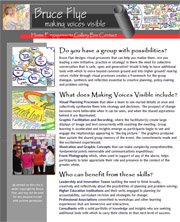Tuesday began with Sarah Lawrence-Lightfoot speaking on Respect as an Active Force. Her memory from childhood, "I'm going to school - will anyone know who I am?" became a guiding theme in the work she's done in studying relationships. Of the 6 dimensions
 of respect, she highlighted curiosity as evidenced in the work of photograher Daiud Bey, an element that invites connection, unmasked experience and reciprocity. Of the eight lessons she has learned about respect, dissonance was the most surprising. She pointed out that it should not be avoided as it illuminates, and that there is value in disturbing the inertia by saying the unexpected.
of respect, she highlighted curiosity as evidenced in the work of photograher Daiud Bey, an element that invites connection, unmasked experience and reciprocity. Of the eight lessons she has learned about respect, dissonance was the most surprising. She pointed out that it should not be avoided as it illuminates, and that there is value in disturbing the inertia by saying the unexpected. A team working with Harvard Medical Associates told how Culture Eats Strategy, citing data that showed how performance problems can be coupled with a compliance model that is especially strong in medicine, and how an overwhemingly disrespectful environment makes matters even worse. They had an anbelievable quantity of content that they actually completed coherently in their presentation, but one piece stood out for me: The Heirarchy of Joining a Team begins with "What do I get?" So often we tell others or are told ourselves to set this aside and think of the greater whole, but systems thinking challenges that duality. We can't take care of ourselves with out taking care of the whole, and we can't take care of the whole without taking care of ourselves. It's not an either-or situation.

Skip Griffin and David Marsing conducted a daunting forum on Inspiring Coherence in Communities by Shifting the Way We Come Together. We speak our social worlds into existence. W
 hat we believe is what we can do. Wanting change is very different from wanting life, and there's never nothing going on.
hat we believe is what we can do. Wanting change is very different from wanting life, and there's never nothing going on. The day ended with Atul Gawande presenting Better: Lessons from Medicine on Performance under Conditions of Extreme Complexity. As the B-17 was originally condemned as "too much airplane," are we now in a situation where there is more medicine than we can handle safely? Why do we fail? One of two reasons: because of what we don't know, or because of what we don't do with what we do know. Complexity in medicine and saving lives demands
 increasing attention on the latter, and that can take the form of three commitments: to measure ourselves, to seek ingenuity and to "give it a try" - asking ourselves if we can make that change. Complexity - sneaky when it's growing - can be managed through organization, and organization is not a resource-dependent approach; the data shows it.
increasing attention on the latter, and that can take the form of three commitments: to measure ourselves, to seek ingenuity and to "give it a try" - asking ourselves if we can make that change. Complexity - sneaky when it's growing - can be managed through organization, and organization is not a resource-dependent approach; the data shows it.


No comments:
Post a Comment